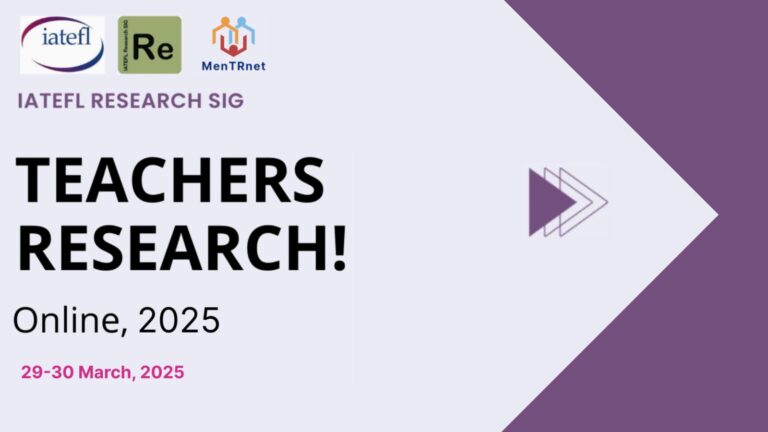
In this blog post, Ana García Stone reports on another event from the International Festival of Mentoring Teacher-Research (2024–25). Here, Ana reflects on the different challenges the various speakers at this event talked about in mentoring teacher-research and how they overcame them. You can watch the recording of the event here and also view the full programme, which includes the links to the posters that were presented.
Why host this event?
The Mentoring Teacher Research Network (MenTRnet) arose in part to provide a forum for mentors to share experiences and provide one another with support through the mentoring process, which is done through online monthly meetings. As MenTRnet is an international community, mentors face a range of problems and challenges, and sometimes they are even working internationally. So as part of the International Festival of Mentoring Teacher-Research in ELT (2024–25), an event was held inviting mentors to share their challenges and how they had overcome them. These were all mentors who had worked with teachers who had presented their research at the Teachers Research! Online 2024 Conference.
The Festival Event
I was one of the speakers at the event and attended all the sessions, but it is only now, reviewing the proceedings, that I’ve noticed that the talks reflect different stages in the mentoring process: motivating teachers; building relationships, collaboration and community; flexibility as a mentor; balance between support and hand-holding; data analysis; teacher reflections; and finally supporting the mentor through mentoring. The mentors who spoke had a range of experience, and were from different countries including Argentina, India, Thailand and Turkey.
The mentors at this event worked within the Exploratory Action Research model, where exploration of the problem or classroom puzzle is encouraged before the teacher moves on to carrying out an intervention and evaluating its success. This whole cycle of classroom investigation can take anywhere between three and six tmonths and in most cases both mentor and mentees are doing this on a voluntary basis in their own time.
Maintaining mentee motivation
Khoi Tan Minh Vuong shared his experiences of building relationships with his mentees in Thailand and emphasised the importance of the first meeting in setting the tone for the mentoring process, and then giving mentees space to think and make decisions during the process as well as being flexible in his role as a mentor.
Both Patcharin Kunna and Chang Liu discussed creating a space where the mentees could collaborate. In Patcharin’s case she included reflective sessions for her Thai mentees at key stages so they could share their progress with one another and offer support. Chang’s group of Chinese mentees were working together, and, with her encouragement, created a learning buddy group where they shared their understanding of the resources given as well as their classroom experiences; the teachers did this independently of Chang. Gyanu Dahal described using allegorical stories to motivate her Thai mentees and to make them aware of their own progress. She described her own journey as a mentor as starting as a caterpillar and turning into a butterfly.
Vinayadhar Raju shared his work as a mentor on a large project in India where after a month teachers ‘disappeared’ and stopped responding to e-mails etc., so Vinayadhar set up online tools where teachers could share their concerns and progress through a WhatsApp group, Zoom meetings and Google docs.
All these talks emphasised the importance of building trust and giving mentees a safe space to discuss their research journey.
Key stages
During the classroom research process there are key stages: deciding on the research question, tools for gathering data, data analysis, and so on. Two stories described mentor support at one of these key stages. Sabreena Ahmed described how she helped a primary teacher in Bangladesh analyse his data on reading skills in a simple way, as for teachers the process of EAR is new and the research process has to be made manageable.
Vanita Chopra and Ella Maksakova shared reflective strategies to challenge mentees in Thailand, India and Uzbekistan to go deeper than the obvious research question in order to bring about real change in subsequent interventions in their teaching.
Throughout the process
Seden Eraldemir Tuyan spoke about community building throughout a research project with a group of PhD students in Turkey. She emphasised the importance of creating a safe space where she avoided ‘judgmentoring’ through active listening and empathy while also clarifying expectations. This was built on throughout the project.
Azadeh Moladoost found that her mentee in Iran was very reliant on her so she aimed to foster independence while offering continuous support by setting boundaries. She asked her mentee to consider possible answers to the questions she was asking and Azadeh decided to respond to her mentee’s questions with further questions rather than answers.
Jittima Duangmanee has gone from being a mentee to mentor in Thailand so she has an ‘insider’s’ understanding of the EAR process. She feels that the most important quality for a mentor is establishing good communication but being willing to be flexible, adapt according to the circumstances and try out alternative approaches.
Mentoring the mentor
Finally, my own talk was about my experience of being mentored while mentoring a group of teachers in Thailand, and how that safe space allowed me to gain confidence and build my resilience when facing challenges through dialogue with Mariana Serra, a colleague from MenTRnet.
Final remarks
Richard Smith closed the event by encouraging members of the audience to join MenTRnet, which has become a strong international community. One member of the audience described mentors as activists, as the work can be transformative for both learning and teaching. So please join us and be part of that transformation!
Smith R. (2020). Mentoring teachers to research their classrooms: a practical handbook. British Council.
About the Author(s)

Ana García Stone
Ana García Stone is based in Madrid and has worked in ELT for 30 years as a teacher, teacher trainer and teacher educator. Her current interests are mentoring teacher classroom-research and teacher-led forms of CPD. She has recently mentored teachers in Thailand and Cameroon.



This is such a great summary of many of the issues we face while mentoring teacher-research, Ana. I missed that session as I was away from base on the day, but it was clearly a memorable event with a wealth of inspiring stories. I can specifically relate to the “hand-holding” issue, as I know that I tend to be overprotective of my mentees and I find it hard to not come up with bright ideas for them incessantly. Being member of this community helps becoming more reflective and more circumspect and MenTRnet is such a brilliant place where we can share our experiences.